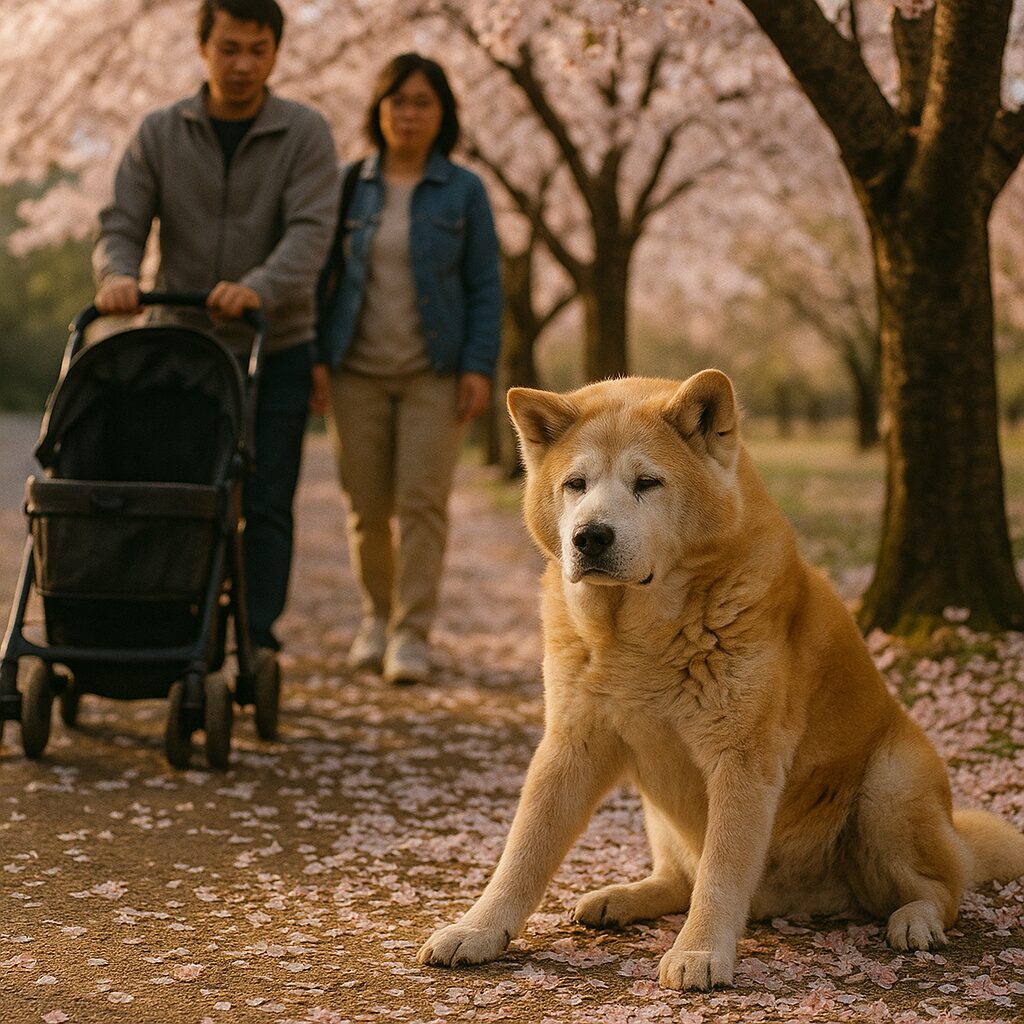There is a certain kind of beauty in Japan that belongs only to spring. It is not just the cherry blossoms, though they steal the first breath of anyone who sees them. It is the fragility of them—the way they burst into clouds of pink and white only to vanish days later, scattered by wind and rain. The Japanese call it mono no aware, the awareness of impermanence. For the Yamamoto family, that year’s blossoms carried a weight heavier than any before.
Because that spring, they brought their old Akita, Kuma, to the park to see the sakura one last time.
1. The Dog Who Grew With Them
Kuma had come to them as a puppy fourteen years earlier, a bundle of cream and red fur with a curl in his tail so perfect that the breeder had laughed, “This one’s destined to be special.” Haruto, then only seven, had begged for a dog for months, promising to walk him every morning before school. His parents, Naoko and Daisuke, relented at last, believing perhaps that a boy who learned responsibility for another life would learn something about himself, too.
Kuma grew fast, his paws stretching into the size of dinner plates, his chest broadening, his voice deepening into the rolling bark that made strangers step back. But inside the house, he was a gentle monarch. He would station himself at the front door whenever Haruto’s friends came over, waiting for introductions like a proper host. He sat beside Naoko in the kitchen every evening, head tilted as if he understood the difference between soy sauce and miso paste. And each night, when Daisuke returned from work, Kuma would meet him at the gate, a silent guard melting instantly into a wagging puppy again.
He was not just a pet. He was family, woven into the fabric of every day.
2. The First Signs
It began subtly. Kuma no longer bounded up the steps to greet them. He hesitated before standing, his legs trembling slightly, then settled back down with a sigh. Naoko assumed it was age; after all, fourteen years for an Akita was already a blessing. But one evening, Haruto noticed blood in the dog’s water bowl.
The vet’s office smelled of antiseptic and quiet grief. After a series of tests, the doctor called them into the consultation room. His face was kind, but his eyes carried the weight of delivering bad news too many times.
“It’s cancer,” he said. “Advanced. We can make him comfortable, but there isn’t much time.”
The words fell like stones into the silence. Haruto squeezed his mother’s hand until both their knuckles went white. Daisuke nodded slowly, jaw tight, as if nodding could keep his own tears from spilling.
They chose palliative care, determined that Kuma’s final days would be filled with comfort, not sterile machines. He spent his mornings lying in the garden, watching sparrows hop among the hydrangea. In the evenings, Haruto carried his food dish to his side and spoon-fed him warm rice and chicken, whispering encouragement like a prayer. At night, Kuma slept inside, head resting on a folded blanket that smelled of all three of them.
3. A Family Decision
By March, the cherry blossoms began their quiet explosion. The Yamamotos had always marked the season by visiting the park near the river, where hundreds of sakura trees lined the paths, their petals drifting into the water like soft snow. The year before, Kuma had walked proudly beside them, head high, tail still curled, leaving paw prints among the petals.
Now he could barely stand.
Still, it was Haruto who suggested it. “Let’s take him,” he signed to his mother. He had lost his hearing years earlier in an accident, but his words—whether through sign or writing—were always clear. “One last time. He deserves to see them.”
Naoko looked at her husband. Daisuke swallowed hard, then nodded.
So on a bright April morning, they lifted Kuma gently into a cart padded with blankets. The dog leaned his head against the edge, eyes half-closed, as if he understood. They set out for the park, their pace slow, the world already softened by the drifting petals that carpeted the streets. Neighbors bowed as they passed, some whispering, “Kuma-chan…” with affection and sadness.
4. The Walk Beneath Blossoms
The park was alive with laughter, children chasing petals, couples photographing each other under the pink canopy, elderly friends sipping sake from tiny cups. Yet when the Yamamotos rolled Kuma’s cart onto the main path, people stepped aside, their joy folding into quiet respect.
Kuma lifted his head, nose twitching. Even in his weakness, the scent of spring reached him. His ears flicked at the distant sounds—though faint now, dulled by age. He watched the blossoms sway overhead, and his tail moved once, twice, in slow, deliberate gratitude.
Naoko knelt beside him, brushing the fur between his ears. “Kuma,” she whispered, though she knew her son couldn’t hear her. “We’re here. You’re with us.”
Then, with a strength that seemed to come from some hidden reservoir, Kuma shifted. He pushed against the cart’s edge, muscles trembling. Haruto rushed to steady him, but the dog refused. He planted his paws on the ground. Slowly, painfully, he rose.
The park grew still. Conversations faded as if even strangers sensed the moment.
Kuma stood, body swaying, legs thin beneath his once-mighty frame. He took one step, then another, paws pressing into the path strewn with petals. Haruto placed a hand at his side, not to hold him up but to walk beside him, equal companions. Naoko and Daisuke followed, tears slipping silently down their cheeks.
Under the arching cherry blossoms, the old Akita walked as though claiming the season for himself. Each step was both fragile and infinite.
After a dozen paces, he stopped. He turned his head toward the family, eyes cloudy yet filled with a calm that needed no words. Then, with the same dignity he had carried his whole life, he lay down.
Petals drifted around him, catching in his fur. A breeze stirred, carrying the faint scent of blossoms, incense from a nearby shrine, and the salt of their tears. Kuma exhaled once, long and deep. His chest stilled.
It was as if he had chosen his own farewell, beneath the trees he had always loved, surrounded by the people who were his world.
5. The Gift He Left
The family knelt beside him, hands buried in his fur, their grief too large for sound. Haruto pressed his face into Kuma’s neck, shoulders shaking. Naoko stroked the dog’s paw, whispering, “Thank you. Thank you.” Daisuke closed his eyes and lifted his face to the blossoms, letting the petals cling to his lashes.
Strangers in the park did not intrude. Some bowed silently, some placed hands together in prayer, others simply turned away with tears in their own eyes. The Yamamotos were alone in their loss, yet surrounded by a community that understood.
They brought Kuma home wrapped in a white cloth, petals still clinging to his fur. That evening, they placed him gently in the garden, incense burning, photos of his life scattered like milestones: the puppy who chewed Haruto’s shoes, the adolescent who guarded the house, the dignified elder who watched sunsets with them.
The funeral was simple. They thanked him, again and again, for years of loyalty, laughter, comfort, and love. And when the cremation was over, they placed his ashes in an urn engraved with cherry blossoms.
6. The Blossoms That Stayed
In the weeks that followed, the house felt unbearably quiet. No soft thump of Kuma’s tail against the floor. No heavy steps following them from room to room. The emptiness gnawed at their hearts.
But then, one morning, Haruto stepped into the garden and noticed something. The cherry tree they had planted years ago—the one that had never bloomed properly—was heavy with blossoms. He stood there for a long time, petals drifting around him, and felt it as clearly as if Kuma stood at his side.
He ran inside and signed to his parents, “It’s him. He gave us flowers.”
Naoko pressed her hands to her mouth, tears spilling anew. Daisuke went to the tree and touched its trunk, whispering, “Kuma, my boy.”
From then on, every spring, the family returned to the riverside park. They carried a lantern for Obon, they spread a blanket beneath the blossoms, and they remembered. And always, they felt Kuma there—in the trembling petals, in the hush of the crowd, in the memory of a dog who chose his farewell with grace.
7. The Lesson of the Petals
Years later, when Haruto had children of his own, he brought them to that same park. He told them about Kuma, the Akita who had raised him as much as his parents did. He described how the dog stood beneath the blossoms and lay down with dignity, giving them his final gift.
His daughter, no older than seven, touched a petal to her lips and asked, “Was he sad?”
Haruto shook his head. “No. He was full of love. He wanted to say goodbye in the most beautiful place he knew.”
And as they sat together under the blossoms, Haruto realized the truth: Kuma had taught them the same lesson the sakura taught every year—that beauty is precious because it does not last, that love is deepest when it lets go, and that farewells, when chosen with grace, become gifts instead of wounds.
The family would never forget that spring day. It was etched into them, not as tragedy, but as a final act of devotion from a dog who had given them everything.
The Yamamotos kept Kuma’s urn near the family altar, but in truth, he was everywhere. In the hush of petals falling. In the stillness of early mornings. In the silence Haruto carried with him after the accident, now softened by the memory of a dog who had once pressed his nose to his hand and said, without words, I am here. Always.
That is how Kuma gave them his last gift—not just the walk beneath cherry blossoms, but the reminder that love, even when it ends, can be carried forward forever.
And so, each spring, when the petals fall, they see him again.

